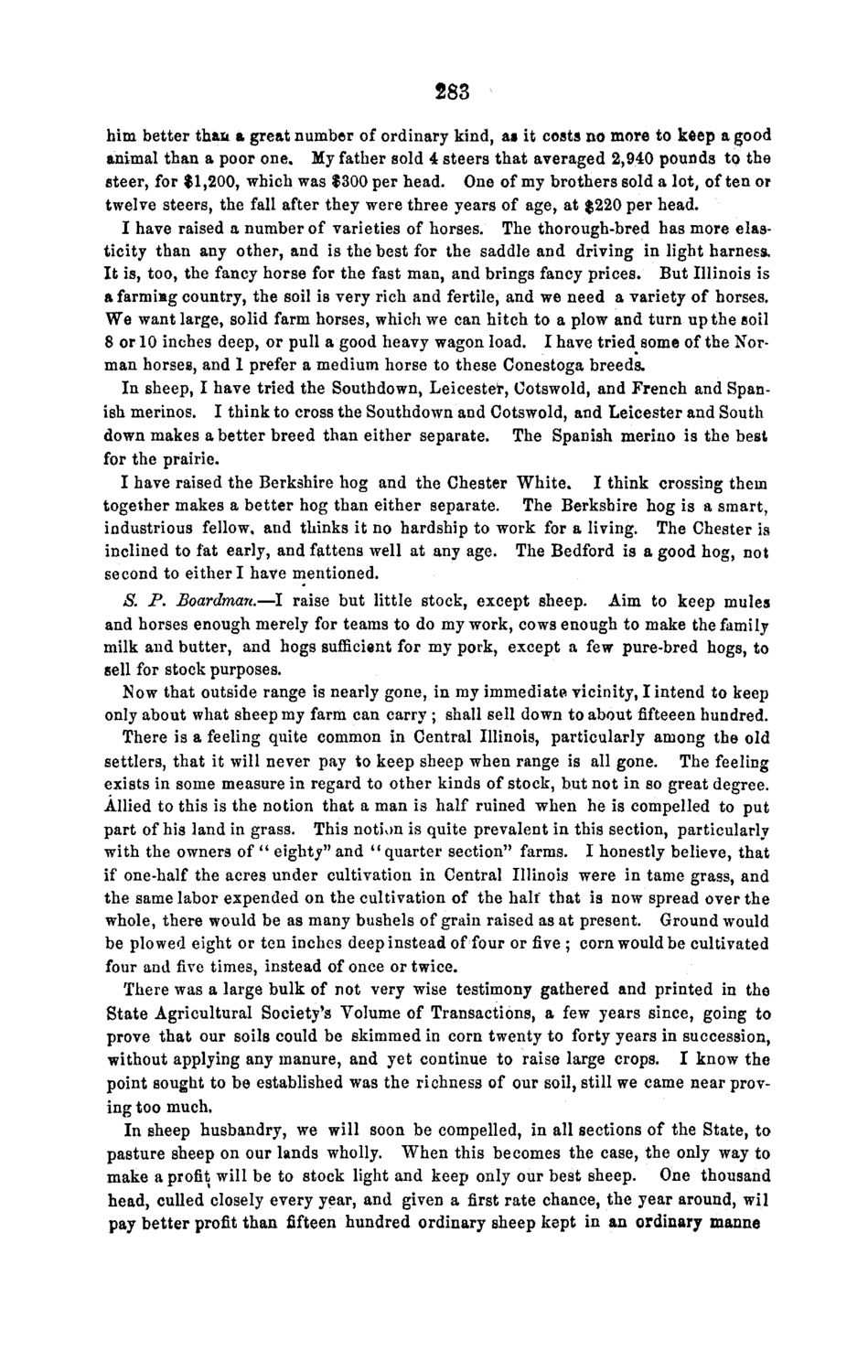| |
| |
Caption: Board of Trustees Minutes - 1868
This is a reduced-resolution page image for fast online browsing.

EXTRACTED TEXT FROM PAGE:
283 him better thaa a great number of ordinary kind, as it costs no more to keep a good animal than a poor one. My father sold 4 steers that averaged 2,940 pounds to the steer, for $1,200, which was $300 per head. One of my brothers sold a lot, of ten or twelve steers, the fall after they were three years of age, at $220 per head. I have raised a number of varieties of horses. The thorough-bred has more elasticity than any other, and is the best for the saddle and driving in light harness. It is, too, the fancy horse for the fast man, and brings fancy prices. But Illinois is a farming country, the soil is very rich and fertile, and we need a variety of horses. We want large, solid farm horses, which we can hitch to a plow and turn up the soil 8 or 10 inches deep, or pull a good heavy wagon load. I have tried some of the Norman horses, and 1 prefer a medium horse to these Conestoga breeds. In sheep, I have tried the Southdown, Leicester, Ootswold, and French and Spanish merinos. I think to cross the Southdown and Ootswold, and Leicester and South down makes a better breed than either separate. The Spanish merino is the best for the prairie. I have raised the Berkshire hog and the Chester White. I think crossing them together makes a better hog than either separate. The Berkshire hog is a smart, industrious fellow, and thinks it no hardship to work for a living. The Chester is inclined to fat early, and fattens well at any age. The Bedford is a good hog, not second to either I have mentioned. S. P. Boardman.—I raise but little stock, except sheep. Aim to keep mules and horses enough merely for teams to do my work, cows enough to make the family milk and butter, and hogs sufficient for my pork, except a few pure-bred hogs, to sell for stock purposes. Now that outside range is nearly gone, in my immediate vicinity, I intend to keep only about what sheep my farm can carry ; shall sell down to about fifteeen hundred. There is a feeling quite common in Central Illinois, particularly among the old settlers, that it will never pay to keep sheep when range is all gone. The feeling exists in some measure in regard to other kinds of stock, but not in so great degree. Allied to this is the notion that a man is half ruined when he is compelled to put part of his land in grass. This notum is quite prevalent in this section, particularly with the owners of " eighty" and " quarter section" farms. I honestly believe, that if one-half the acres under cultivation in Central Illinois were in tame grass, and the same labor expended on the cultivation of the half that is now spread over the whole, there would be as many bushels of grain raised as at present. Ground would be plowed eight or ten inches deep instead of four or five ; corn would be cultivated four and five times, instead of once or twice. There was a large bulk of not very wise testimony gathered and printed in the State Agricultural Society's Volume of Transactions, a few years since, going to prove that our soils could be skimmed in corn twenty to forty years in succession, without applying any manure, and yet continue to raise large crops. I know the point sought to be established was the richness of our soil, still we came near proving too much. In sheep husbandry, we will soon be compelled, in all sections of the State, to pasture sheep on our lands wholly. When this becomes the case, the only way to make a profit will be to stock light and keep only our best sheep. One thousand head, culled closely every year, and given a first rate chance, the year around, wil pay better profit than fifteen hundred ordinary sheep kept in an ordinary manne
| |